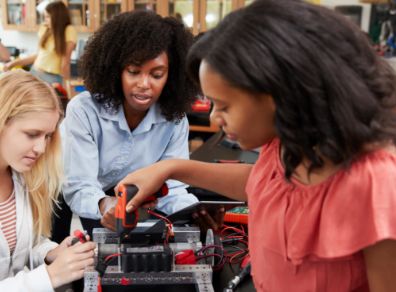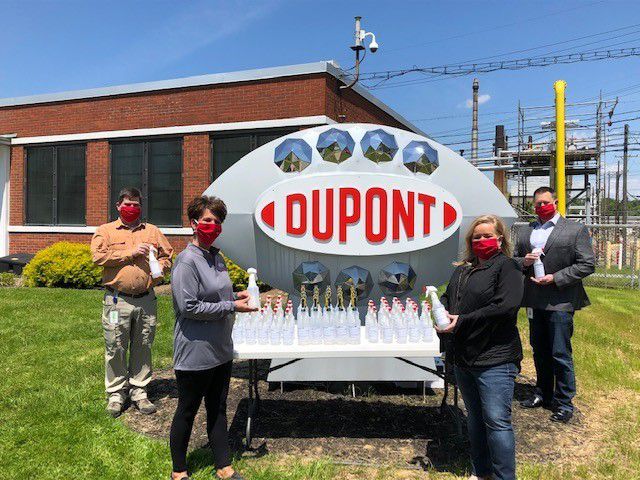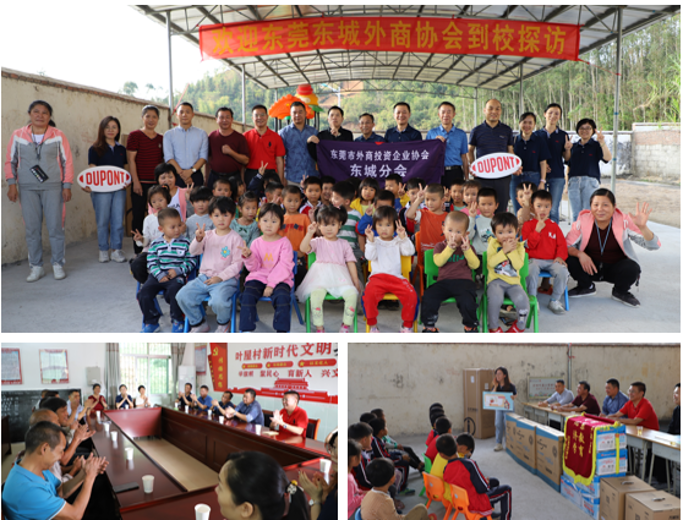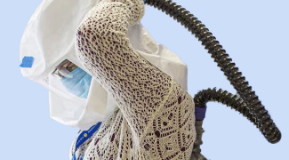Goal:
_____
Improve over 100 million lives through targeted social impact programs
Roadmap to 2030
As we work towards our 2030 objectives, we focused our efforts in 2020 on:
01
Continuing our corporate partnership with Habitat for Humanity International, and pivoted funding to meet local Habitat for Humanity affiliates’ needs in responding to COVID-19. In 2020, our Habitat for Humanity partnership yielded 1,774,605 donated items
02
Launching a new grants management system to nonprofit partners in the US, which piloted in our headquarters community. The system will help us understand how our community investments are serving constituents and impacting communities
03
Developing a new employee volunteer portal to help track and recognize volunteer service and measure outputs against our community impact goals. This portal is being piloted in the US in early 2021 and is expected to launch globally later in the year
Image: Employees at our Washington Works site distribute DuPont-produced hand sanitizer to local communities in Virginia
Wherever DuPont operates around the world, we want to enable people and communities to thrive. In 2020, we began to execute against our revamped Community Impact strategy, which was updated in 2019 to better align with the company’s purpose and strategic business goals, while creating impact for DuPont and our local communities.
Executive responsibility for our Global Community Impact Team lies with our Chief Technology and Sustainability Officer to help ensure that we are executing against an integrated strategy that leverages our people, products, and partnerships to support and advance Community Impact initiatives in three key areas of focus that are core to DuPont:

Basics to Thrive
Empowering communities by increasing access to critical needs such as water, shelter, nutrition, and economic opportunity

STEM Education
Increasing access to STEM education for all, and helping to build a talent pipeline for the future

Innovations for Good
Focusing our science and innovations on megatrends that can improve people’s lives and create scalable impact in communities around the globe
To help drive progress in these strategic areas, we partner with local, national and global organizations to develop programs that can make a meaningful difference in people’s lives and achieve measurable outcomes at scale. Beyond funding, we believe the most successful collaborations involve all our assets—people, products, and partnerships—alongside our customers, our suppliers, and community organizations.
Our Global Community Impact Team leads our efforts by helping executives, business leaders and local site teams to engage stakeholders, build long-term relationships, and develop high-impact programs that address critical community issues. In addition, we continuously seek to engage our employees through volunteerism, both skills-based and traditional, to help build thriving communities.
Image: DuPont partners with Habitat for Humanity International to provide safe, affordable housing for families worldwide
In 2020, we completed a strategic assessment of our impact as it relates to communities of color, in an effort to enhance our ability to target diverse and underserved groups in our communities. This effort strengthened the partnership between DuPont’s Global Community Impact and Diversity, Equity and Inclusion (DE&I) groups, and led to the teams collaborating to integrate DE&I goals and targets into our U.S.-based community impact work. We also leveraged the knowledge, connections and passion in our Corporate Black Employee Network to guide local action plans, resulting in DuPont’s participation in the new Delaware Racial Justice Collaborative, sponsorship of HBCU Week and diverse programming in Wilmington, Delaware, and volunteerism to advance voter outreach in minority communities on Election Day 2020.
We are also exploring scalable, virtual STEM education solutions to uniquely address the needs of under-represented minority communities. These solutions will utilize a cross-functional education strategy that aligns with DuPont’s future workforce needs, creating employment pipelines and providing a more diverse landscape for our future hiring practices.
Image: DuPont partners with local nonprofits, such as the YMCA of Delaware, to support afterschool programs that provide programming for teens in a safe community environment
Across DuPont, teams from local sites, our businesses, and functions banded together to answer the call to support local communities as they managed COVID-19 impacts in 2020. That included rallying to do new things, like producing, packaging, and donating approximately 45,000 liters of hand sanitizer in DuPont communities across Canada, Germany, and the U.S., and leveraging existing partnerships, as we did in Latin America to donate 500 computers to help low-income students attend school remotely.
We also donated our own PPE products to hospitals and other front-line workers in our local communities during the height of the PPE shortage in 2020. In addition to over 148,000 Tyvek® protective coveralls our Water & Protection business donated to frontline and essential workers around the world, and our Electronics & Industrial and Mobility & Materials businesses used DuPont’s 3D printers and our current inventory of 3D1000 nylon filaments to produce and donate 3,540 headband bases and 915 reusable face shields to healthcare workers at hospitals near our Wilmington, Delaware, headquarters. After proving successful manufacturing and distribution, the method was duplicated at other DuPont sites to meet local needs in both Michigan and California.
Image: DuPont E&I and M&M 3D-printed 3D1000 and donated reusable face shields to local hospitals
Clear into the Future® is an employee-led, long-standing, global grant program created to drive positive environmental impact in our communities. This competitive grant program is held annually with awards going to non-profits and educational institutions. Clear into the Future® supports employee-nominated environmental programs that engage and educate the communities in which DuPonters live and work. Grants also support scientific work that expands the understanding of ecological challenges and opportunities in these communities. All of the supported projects focus on creating impact in one or more of five areas: climate change adaptation and mitigation, water stewardship, circular economy and ecosystem services.
In 2020, Clear into the Future® awarded 26 grants to nonprofits in three countries, delivering environmental and social impact in 28 DuPont communities. Many of these programs offered employee volunteer opportunities, but due to the global pandemic most in-person engagement was placed on hold.











